

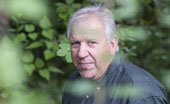
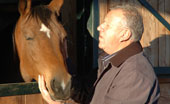
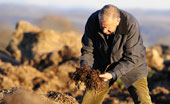
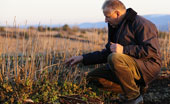
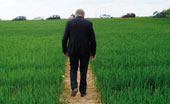
The "farmer-researcher" from Aveyron
(Interview of Marcel Mézy in 2009)
A discovery well ahead of its time!
While driving his pick-up, Marcel Mézy has the smile of a man who is happy to share his passions. On this Causse of north Aveyron, he promised to take us to the root of his discovery, already 25 years ago. The land is hostile but the purebred Arabians he breeds over more than one hundred hectares animate these large fields swept by the rain in the first days of December. Horses are one of the passions of this 70-year-old farmer who would like to devote more time to them.
But another fight, a lifelong one, has always been in this pioneer’s mind: restoring damaged soils and often polluted by chemical inputs, so that farmers can regain their autonomy but also their pride through preserving actively the planet.
Marcel Mézy likes to repeat this farming saying: "when humus goes, man goes." Now, it was when he mixed composts from different plants that everything started. On the grass strips of his meadows, Marcel Mézy is relating his story, as a real story-teller that we can imagine remaking the world by the fireside in front of a captivated audience.
A helping hand of fate
Eight brothers were living at his grandparents’ farm which rapidly turned out to be too small to feed everyone. Marcel left and hit the road to sell beverages for a wholesaler but also fertilizers and agricultural products. He was thus one of the first traders trying to sell organic products whose yield results were then unfortunately insufficient to rally the farming community.
Marcel Mézy is a self-educated man and at night, he used to study scientific magazines dealing with organic farming. In the seventies, he was interested in composts very early, being aware that those microorganisms could act as a catalyst and restore the soil natural capacity to hold nutrients.
In the early eighties, a hand of fate helped him take a step forward: "I had been making composts with different methods for years, in particular German ones, and the results had been quite the same. One day of 1982, as I had no more room for experiments, I put my composts one on the other and I discovered that the mixing of plants from woods and from meadows, for example, gave completely different results."
After analysis of the first measurements on those composts, results were so amazing that Marcel Mézy thought that the laboratory had made a mistake. The following samples carried on bringing hope. Time to spread those composts on fields had come. The first results went and strengthened what he had been thinking for long: as the production of humic acids in the soil was low, the Bozouls farmer had then the proof that we can produce them very quickly without manure input.
During the eighties, the company remained at a small scale but benefited a growing number of farmers from Aveyron. Marcel Mézy’s glance is illuminating when he evokes that period of friendship and solidarity: "My prevailing goal was to benefit the farmers who worked with us. They quickly realized that they did not lose their yield, their livestock was less often sick and overall, their lands were more fertile."
"The farmers are our best ambassadors"
Then the word of mouth started to work perfectly and Marcel Mézy’s discovery quickly crossed the Aubrac’s hills and the plateau of Lévézou. In Brittany, in the Limousin, in the Basque Country, some farmers took the plunge, many of them abandoning totally chemicals. The number of information meetings multiplied while concurrently, some agricultural bodies and some big chemical industry consortiums were leading a false information campaign to denigrate that spoilsport.
The Sobac creation in 1992 worsened the situation but Marcel Mézy is not a man to be submitted. "The farmers who share this venture with us are our best ambassadors." What some people wanted to present as 'magic cure' saved more than one farmer who would not hesitate to testify in hard times.
At Sobac, we like to repeat: "We have helped many farmers to regain their pride, and transmit their passion to their children." Researchers and emeritus professors from INRA have been lending more and more scientific support to the farmer-researcher from Aveyron who, with his partners, are now heading a company with more than sixty employees.
Like those plants that take root deeply and firmly in the Causse’s soil thanks to his discoveries, Marcel Mézy’s ideas are shaking up the formatted farming community. Henceforth, nothing will be like before.
Sitting on a low wall of dry stones, looking towards the uneven horizon of the Aveyron’s countryside, Marcel Mézy knows that, with the ones who have been supporting him since the beginning, history has started inescapably : "Mentalities are evolving, the Grenelle de l’Environnement (France’s Environment Round Table on ecological and sustainable development issues) make people think. People rush to the cinema to watch documentaries dealing with these problems. Pesticides scandal is worse than asbestos. People start to know but it will be terrible."
At the bend in a path, on one of the three spots where composts are humifying in the midst of junipers, Marcel Mézy has a mischievous smile. He gives us some clues to understand better his process but will keep secret the composition of his products.
Years are passing by and the number of projects is growing. Night is falling on the Causse. Marcel Mézy tells us about another dream: "I wish so much that one day this product could be distributed freely in Third World countries. Hunger in the world is not fate."
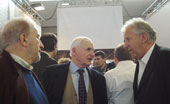
SIA 2011
From right to left:
Marcel MÉZY with
Marcel MAZOYER*
Agricultural engineer professor at the PARIS XI University and
Georges TOUTAIN
Honorary Chairman of the MDRGF*
*MDRGF: Mouvement pour le Droit et le Respect des Générations Futures (Movement for the Right and Respect of Future Generations)
*Marcel MAZOYER Agricultural and forest engineer and expert in agricultural economy, professor at the PARIS XI University, editor of the latest “Larousse” specialized in agriculture, professor emeritus of Agricultural Development at the National Agronomic Institute of Paris-Grignon. He was chief of the Department of Economy and Rural Sociology at the INRA (the French National Institute of Agricultural Research) (1972-1975) and president of the FAO Programme Committee (1983-1993).
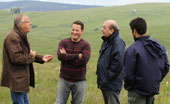
Marcel Mézy on the Aubrac during Jean-Paul Géné’s report for MONDE 2 (second from the right)
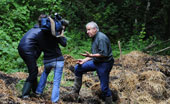
Marcel Mézy in the midst of composts during the France 2
![]()

![]() Homepage -
Legal notice -
Contact us
Homepage -
Legal notice -
Contact us
The invention -
Sharing with the world’s farmers -
Marketing -
Humus production -
Carbon Storage -
Natural fertilization -
Water-saving solution -
Regenerating "dead" soils -
Solution for saline soils -
Recycling of organic waste -
Food solutions -
Biodiversity impacts
© Marcel Mézy technologies™ Environmental Solutions - 2012-2013 all rights reserved